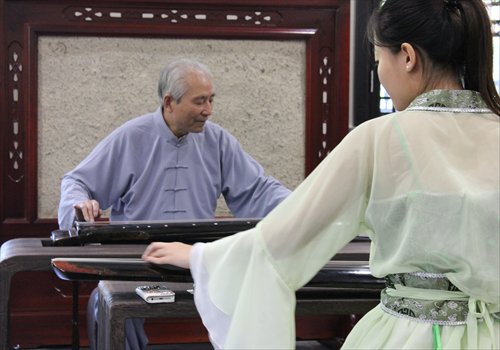
A student learns to play guqin, a traditional Chinese stringed instrument, with her teacher. Photo: Li Jingjing/GT
Along the beautiful shores of Daming Lake in Jinan, Shandong Province, lie several buildings built following the style of ancient Chinese architecture. As you approach the compound, the musical sounds of guqin, a traditional Chinese stringed instrument, can be heard coming from inside, while people wearing traditional Han ethnic styled clothing may pass you on your way.
These buildings make up the campus for the newly built Nishan Academy, adjacent to the Shandong Provincial Public Library. Focusing on the teaching of ancient Chinese culture, it looks to imitate the academies of old that once existed in China before the modern era.
Referred to as shuyuan in Chinese, academies such as this were independent educational organizations that can be traced back to the Tang Dynasty (618-907). The original Nishan Academy was built during the Yuan Dynasty (1271-1368) on Nishan Mountain in Shandong.
To emphasize the importance of these academies in modern society, in the preface for The Chinese Academy Dictionary, the late sinologist, writer and linguist Ji Xianlin once wrote, "Shuyuan, that ancient model of running a school, still has meaning in current society. We should take the essence and discard the dross, using this model and adding new content to let it serve for socialism."
A window to the past
Classes teaching guqin, weiqi (Go) and other traditional subjects are held in the halls of the Nishan Academy. In one large yard, students wearing traditional Han ethnic clothing practice archery.
Archery is one of the classic "six arts" - rites, music, archery, charioteering, writing and mathematics - that formed the foundation of an education system that originated in the Zhou Dynasty (1046-221 BC).
In another building, public lectures on "The Four Books (The Great Learning, The Doctrine of the Mean, The Analects of Confucius, and The Works of Mencius) and Five Classics" (The Book of Songs, The Book of History, The Book of Changes, The Book of Rites and The Spring and Autumn Annals), major works in the Confucian canon, are also held.
Although these subjects may seem outdated they are an important part of Chinese tradition. To emphasize the important role in carrying on this tradition, in September of last year, Xu Jialu, former vice-chairman of the Standing Committee of National People's Congress and president of the Nishan Academy, stated that academies such as the Nishan Academy should shoulder the responsibility of promoting traditional Confucian culture by providing an important supplement to modern education.
Yu Xiaofeng, a staff member at the Shandong Provincial library, told the Global Times that they provide lectures for free every weekend, inviting Sinology experts to talk on different topics. Archery, guqin and other classes are also free of charge.
"We are providing a platform for teachers and those interested in traditional Chinese culture," explained Yu.
We Recommend:
